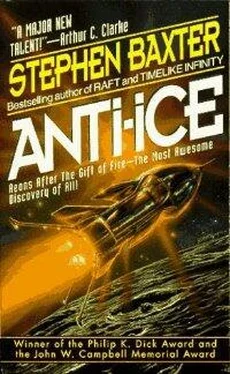“Do you mean a bomb?” I asked, incredulous. “But a bomb of sufficient strength could wreck the Rail. Dozens—hundreds could die!”
The policeman looked somber.
“Who would do such a thing?”
“Ah.” He tipped his helmet back. “The world is full of Anarchists, Socialists and other lunatics, sir; not everyone is as sensible as you or I.”
Holden touched my sleeve and drew me away. “Maybe,” he murmured, “your hay-covered friend is right. But I fear there are plenty of other suspects for such an atrocity, any one of whom might seem quite as rational as you or I—or even as Constable Corn-dolly over there.”
I laughed. “But who?”
Holden shrugged. “The Rail is a beautiful artifact, is it not? But there are many who will regard it as a threat. Anything new is a danger to the Old Order, you see, my young friend. Anything new demands new ways of seeing things, new ways of thinking—and, in some parts of our Continent—such revolutions simply will not do.”
I rubbed my chin and peered up; the gleaming arc of the Rail swept out over the Channel, oblivious of my confusion.
* * *
It was after nine of the evening when at last we boarded the Mechanical Staircase which drew us high into the air and to our train. I looked out over the harbor. The sun was close to the water now and the Moon hung high in the sky, a perfect crescent; the Little Moon was a potato-shaped blur that climbed like a cloud into the darkling sky.
From the Staircase we queued to cross a short bridge. I glanced up the length of the train to the locomotive. The great device lay along its single rail like some great iron panther, its gleaming linkage arms wreathed in condensation. The locomotive was generally cylindrical in layout, like the older coal-fueled designs—although its stack was a mere sketch, a ring of iron barely two inches high. I understood that this locomotive would not expel great volumes of coal smoke; indeed, the mist I saw was not smoke or steam, but condensation gathering around the great Dewar flask which lay at the heart of the locomotive, maintaining its few precious ounces of anti-ice at Arctic temperatures.
A brass plate riveted to the cylinder bore the engine’s number and a name: Dover Flyer. I smiled at this quaintness.
I handed my carpet-bag to a porter, who carried it along a terrifyingly narrow footpath to a baggage car, and then I followed Holden into our carriage. The carriage itself was more than comfortable, with broad, well-cushioned couches upholstered with leather dyed the rich purple color of the International Light Rail Company. A steward, a small chap with a face rather like a monkey’s perched incongruously above his clean white coat, brought us drinks—I had a scotch and water, Holden a brandy—and, as we waited for the rest of the passengers to board, we settled into a couch by a broad picture window in order to smoke and talk.
I remarked to Holden how taken I had been with the quaintness of our locomotive’s design, contrasting it unfavorably with the new bullet-profiled devices on display at the Exhibition. Perhaps, I reflected, the advances wrought by anti-ice were not without their cost. At some comfortable length we debated this point, and our talk broadened out into the role and impact of anti-ice technology in general; and finally Holden, becoming more expansive as he relaxed, settled down to relate to me the intriguing tale of the discovery of anti-ice itself…
* * *
The story of anti-ice (Holden said) began with obscure legends of the aboriginal Australians. According to these savage fellows, at the time the Little Moon first appeared in the European heavens (around 1720), “fire locked in ice” fell from the Australian sky. This ice was tinged with yellow and red, and any man who cupped his hands around the ice would liberate the daemonic fire, to his ultimate doom.
The British explorer Ross, en route to the Antarctic, was intrigued by these legends, overheard in a low bar. He resolved to track them to their source.
His quest brought him to Cape Adare, an Antarctic peninsula south of the Australian continent. Ross and his party spent some days scouting the ice-locked plains. At length they approached a range of low, toothlike mountains and unexpectedly came across a plain strewn with massive boulders. As his dog team threaded its way between these jagged, ice-coated fragments, Ross reflected (he reported in his journal) that it was as if a mountain had exploded and now lay strewn in pieces across the ice. And, oddly enough, there was a gap in the mountain range; it was rather as if a tooth were missing from an otherwise healthy jaw.
As Ross neared the heart of this strange plain he found that the size of the boulders diminished, until the runners of his sled crunched over gravel-like pebbles. The ice hereabouts was also very strange; it was glassy-smooth and, if the top couple of inches were brushed away, quite clear; and there were pebbles and boulders embedded within, as if in amber.
“It seemed to Ross,” said Holden, “as if a great explosion had taken place here. A mountain had been shattered, with great boulders hurled miles through the air; in an instant the ice had been flashed to steam which had risen in great clouds into the freezing Polar air. The ice had re-frozen rapidly, embedding the debris.” Holden knocked dottle from his pipe, his gnomish features alive with the impetus of his narrative.
With growing excitement Ross pressed on (Holden said).
And at last he reached the very center of the great explosion.
A dome of some yellow substance, perhaps ten feet high, protruded from the ice.
At first Ross thought this was some form of building, and he wondered if he was to discover an unsuspected tribe of Antarctic aboriginals. But he quickly realized that this was no human construction; nor, indeed, was the dome hollow. This was some strange new ice. Ross pressed his face to the chill surface, wiped away a few inches of fresh snow, and peered into the enigmatic interior.
Sheets of a pinkish-red substance hung like veils within the yellow mass.
The party made camp in the lee of the ice dome. Ross was aware that his safest course would be to take back samples of the ice to his ship—or even to England—for thorough analysis. But he remained fascinated by the aboriginals’ tales.
He was an inquisitive man; he was, after all, an explorer.
So, when the brief Antarctic night was over, Ross had one of his men scrape away enough of the stuff to fill a tin drinking mug; and this mug was fixed over a small stove.
Most of Ross’s party gathered around the stove.
“The resulting explosion,” Holden said somberly, “killed three men outright, and left the rest grievously wounded, their dogs dead or terrified and their sleds overturned. Ross himself was to lose an arm and an eye from the incident, and he describes finding, at the site of the stove, a crater a full six feet wide melted into the ice.” Holden smiled. “His journal entry for that day became famous. ‘Left in a parlous state by this yellow ice. Of the stove, and Ben’s mug, we could find no trace.’ ”
I felt tears prickling my eyes at the simple courage of these words—so typically British, I thought!
Ross and his companions—those surviving—returned to their vessel and made for the nearest civilized port.
“When the news of the discovery reached England the Royal Society dispatched a fresh expedition, fully equipped with the latest scientific apparatus, to Cape Adare; and now that Cape supports a veritable town of Scientists and Engineers. Traveller himself calls the Godforsaken place his second home. And there is a whole new profession—the Cryosynthesists—worthy gentlemen who devise ways, using vast Dewar flasks and so forth, of transporting anti-ice from the Cape and around the globe in a safely chilly condition.”
Читать дальше












